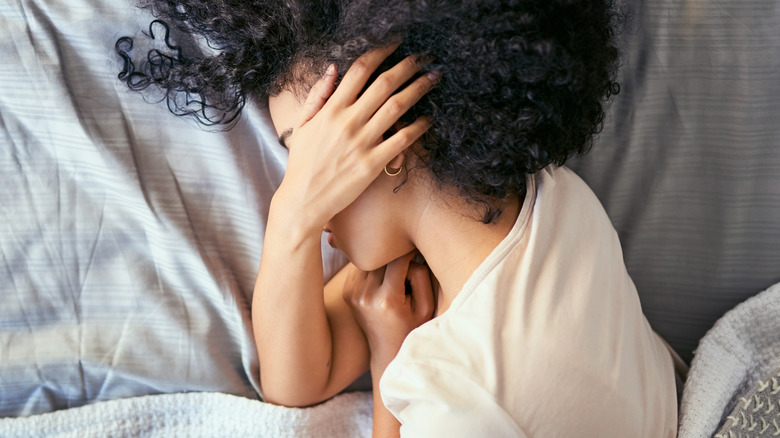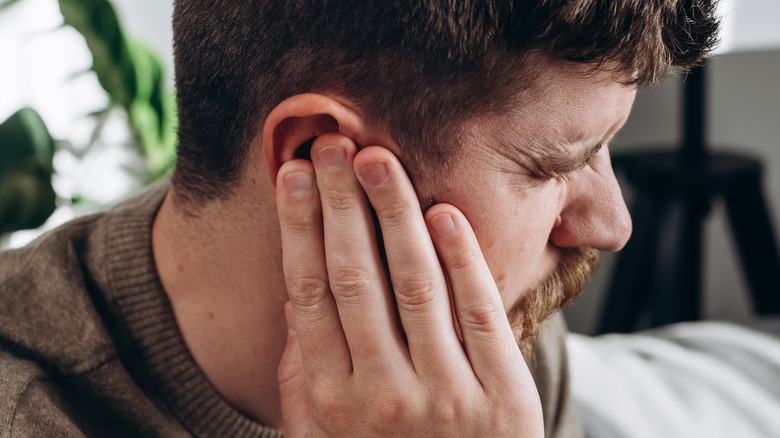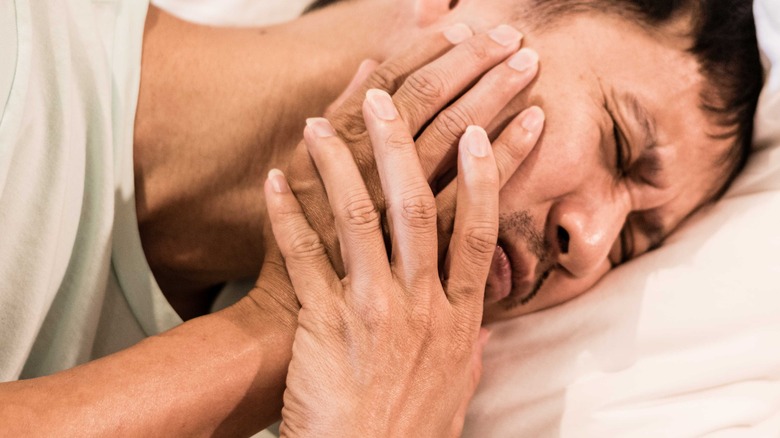What It Means When Your Ear Hurts After Waking Up
You woke up in the morning with ear pain. Your first thought might be that you're developing an ear infection; this is a reasonable explanation, especially if you have an upper respiratory infection. The tubes of the ear become plugged and inflamed during a cold or flu, leading to bacteria getting trapped in the middle ear, per the Mayo Clinic. Ear infections typically come with other symptoms like fever, dizziness, and drainage. However, if you wake up with ear pain every morning, the reason is likely something else.
According to the Centers for Disease Control and Prevention, the ear comprises three parts. Problems affecting the middle and inner ear will affect how you hear. However, problems with the structures of the ear, like the ear cartilage, and structures around the ear, like the jaw joints, typically don't affect your hearing. For example, you could have pain in your outer ear from pressure on your ear cartilage or temporomandibular joints (TMJ) while sleeping on your pillow. Learn what ear cartilage pain and TMJ ear pain feel like, and what treatments can help you get the relief you need for a pain-free morning.
Pressure on the ear cartilage causes pain
More often than not, morning ear pain comes down to how you sleep on your pillow. Side sleepers are prone to feeling the burn in their ear.
As Dr. Anil Safaya explains via Doctor NDTV, the outer part of the ear gets pressed into the pillow, creating pressure, which leads to swelling and pain in the outside of the ear. Turning over can help to relieve the pain; however, when you don't turn over and release the pressure during the night, you can wake up with an aching ear. The pain will eventually subside after the pressure is released, so your ear will begin to feel better after you wake up. The Body Fix Clinic states that the phenomenon is common among those prone to sleeping on their side with an incorrect pillow.
Since you can't make yourself move around at night, especially when you're partaking in a deep and restful sleep, getting a softer pillow can be beneficial. This gives your ear some wiggle room that a harder pillow won't. Body Fix Clinic also notes that your neck should be straight with your spine when sleeping. Try a pillow with an ear hole to help remove the pressure from your ear, but keep everything aligned.
Morning ear pain from TMJ disorder
The TMJ is a hinge that connects your jaw to your skull on both sides, per the Mayo Clinic. However, sometimes this joint can be prone to diseases known as TMJ disorders. It could be the reason your jaw pops when you yawn or cause your jaw to lock into place. TMJ can also cause pain and tenderness of the jaw, aching in and around your ear, difficulty chewing, and facial pain.
Laying on your pillow at night puts pressure on the TMJ. Per a letter published in JAMA Otolaryngology – Head and Neck Surgery, "[s]leeping on one side for several hours can have a traumatic impact on the temporomandibular joint, particularly if the pillow is high." Writing for the Berger Henry ENT Specialty Group, Dr. Alan S. Berger explains that TMJ-related ear pain is typically worse in the morning or at night. Sufferers will also feel like their ear is clogged or stuffy, but without affecting their hearing.
Treatment requires limiting chewing and movement of the jaw. Therefore, experts recommend eating a diet of soft foods for a few weeks so that the jaw doesn't have to move as much. Wearing a bite guard when sleeping can also be beneficial to prevent grinding of teeth or jaw movements. Lastly, using a warm compress on your jaw and taking over-the-counter NSAIDs can also counter the inflammation and help relieve pain.



